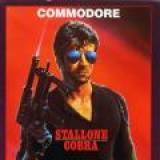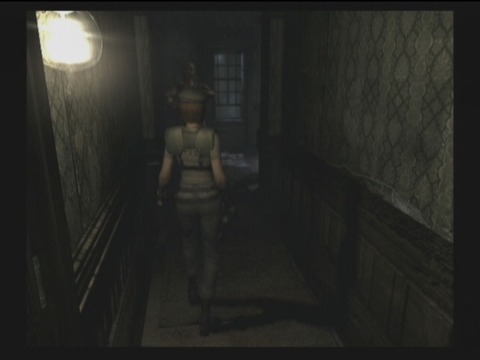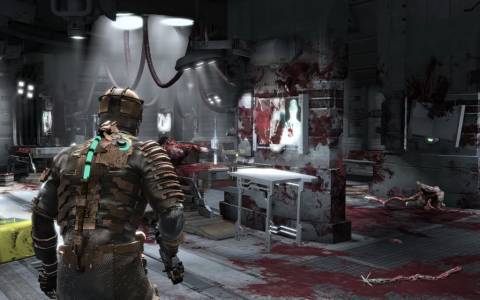"It's Just Like A Movie"
By mackdaddicus 4 Comments
Is the single phrase that dives me crazy when I hear someone talk glowingly about a video game. This straw-man will often begin by talking about how much they enjoyed the game, how it was like nothing they had played before and will ultimately conclude by saying something to the effect of "it's awesome because it's just like a movie." Fundamentally my problem with this comparison between games and movies is that if I wanted to watch a movie, I'd watch a movie. There is no divine compulsion requiring me to play games, or this hypothetical game in particular. When it comes down to it, we all have choice in how we choose to occupy our free time.
The type of game that always gets this description is an action game getting compared to an action movie (although I'd love to see it, the only way we could see a romantic comedy game adaptation is in the medium of a poorly made indie game). The only reason action games can get this description is because, by virtue of it being a game, the player character has to be "doing something," and in the world we live in now, that means shooting or driving. I love action movies, but since when is getting compared to one of them a good thing. If I bought a novel and told you that it's just like the Fast and the Furious, you'd think it's fucking garbage and you wouldn't read it (although I live my life a quarter mile at a time, so I'd naturally be interested). However, if I came to you with a driving video game and told you it was just like the Fast and the Furious you may get excited (the straw man audience I'm talking to here, looooooooooves Paul Walker). Alternatively if I came to someone with the proposition that I've got this rad game with portal guns, robots, and block puzzles, based on that description they'd want nothing to do with that game.
Why can't games be games, movies be movies and books be books? It's this very problem that leads to major game companies hiring Hollywood script writers to pen the scripts to their games, that will in all likelihood have monster budgets and not sell well (COD is the obvious exception to this, but give it a couple more years); while Valve can make a block puzzle game with portal guns that is immediately more satisfying, better written, and is also monstrously profitable. Modern Warfare 2 was lauded for having an exemplary story, that if compared with film would show itself to be simply an amalgamation of plotlines from "24" and "The Rock," neither of which is normally considered to have quality writing.
Portal is why we play games. Every aspect of Portal requires the player to discover and to use free will to make decisions. The discovery aspect is found in the game leaving it's narrative for the player to discover. The side-rooms where a previous inmate scrawls warnings about a foreboding cake at the end of this journey, are completely genius - at once they tell you that you are part of a sinister project and they enable you to discover how to avoid this ultimate trap . All of this discovered through the choice of the player, they can completely ignore it and fall to a fiery death if they so desire, or they can continue searching for more information. Portal has a story and it is up to the player to find it (other games also get it, the Left 4 Deads come to mind, but they develop story in a different way that I will describe now). Shigeru Miyamoto, when discussing his inspiration for Zelda, often talks about how he wanted to make a game that captured the sense of discovery he had as a child exploring the world - I think this goes to the core of what makes a good game and why we play games.
Although it might seem odd, I believe multiplayer games can do a much better job of developing a story that is more authentically "game" than "movie." Every multiplayer game of L4D creates a story unto itself with the players as the characters. For instance, in a game where I am on the losing team, I want to do whatever I can to help my team win, if we come back to pull off the victory, I will have a genuine experience with that game, that I don't think we can say we have with the single player "story" in a call of duty game. The beauty of the video game is that our free will is completely tied up in the proceedings of the game - I am doing what I am doing in the game because I am willing it to happen. A great game recognizes this an gives the player the pen with which to write his/her own story.
Multiplayer speaks to something authentic at the heart of why we play games, especially when compared to single player "story" experiences. When the game holds the players hands too much, and is merely using the medium of the video game to present a film-like story, it does both the medium and itself a disservice. I think this shows up in modern AAA blockbuster games like Modern Warfare 2, where 1435115 Billion dollars were spent on its creation, much of which likely went into the creation of its single player (hiring voice actors, script writers, etc.) when all anyone really cares about is its multiplayer.
I think we need to get away from the intense hand-holding story-focus that is present in games today, and let players make stories on their own - at the end of the day, I think that's why we play games.
If this was at all interesting to you, check out my blog at turbobutton.blogspot.com - I'll pull ad for my blog immediately if it's a problem, I did a quick check and didn't see anything against it.




Log in to comment